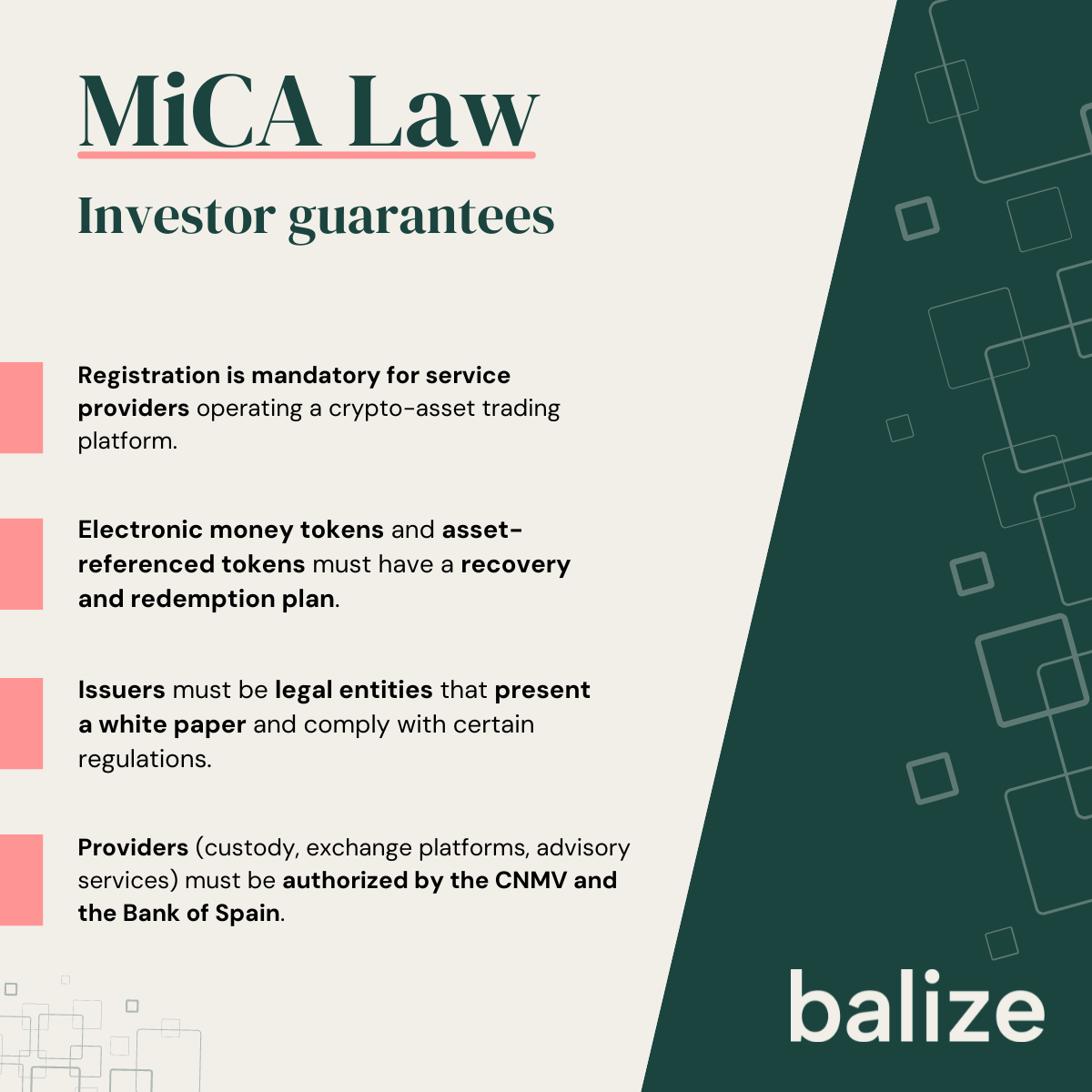The first comprehensive european and global regulation on cryptoassets. The European Regulation on Cryptoasset Markets (MiCA) will come into force in the summer of 2024 and will be applicable from December 30th. It establishes obligations for both issuers and service providers. Below, we outline the most important aspects of the regulation applicable in the Eurozone.
Cryptoassets regulated by MiCA
The text defines a cryptoasset as “a digital representation of value or rights that can be transferred and stored electronically, using distributed ledger technology or similar technology.” There are three categories based on the type of issuer:
1. E-money Token (EMT): equivalent to EMT in English (e-money token). It is a type of crypto asset that, in order to maintain a stable value, is referenced to the value of an official currency.
2. Asset-referenced token: The ATR (asset-referenced token). It is not an e-money token and aims to maintain a stable value referenced to another value or right, or a combination of both, including one or more official currencies.
3. There are other crypto assets such as the utility token, called a “consumption token,” which only provide access to a good or service provided by its issuer.
The first two types described require authorization, must be issued by an authorized credit institution or an electronic money institution. Additionally, it is indicated that asset-referenced tokens must have own funds with a limit of 350,000 euros or 2% of the asset reserve, in order to cover their liability to the token holders.
Investor guarantees
The regulation imposes mandatory registration of service providers operating a crypto asset trading platform. On the other hand, they must be able to settle transactions executed on and off the chain and ensure timely settlement.
Both e-money tokens and asset-referenced tokens must have a recovery and redemption plan “to ensure the protection of the rights of their holders in case the issuers cannot fulfill their obligations” and to avoid liquidity risks.
It also explains what institutions understand in relation to other concepts such as custody and administration of crypto assets, exchange, placement of the same, advice, management, and transfer of portfolios.
Issuers must be legal entities that present a white paper and submit to certain prudential, corporate governance, and investor protection standards.
In Spain, providers (custody, exchange platforms, advisory services) must be authorized by the CNMV. Precisely, this body together with the Bank of Spain are the competent authorities for the application of MiCA.

Assets not regulated by MiCA
The regulation also mentions assets that will not be regulated, directly excluding crypto assets that are considered financial instruments such as security tokens, funds, deposits, life insurance contracts or pension plans as well as unique and non-fungible crypto assets (NFTs) and Bitcoins, although their trading on a platform will be regulated under MiCA.
Tokenization in Spain
In this context, Europe and, in particular, Spain, are betting on tokenization.
Spain advanced the application of the Regulation to expedite the implementation of the regulation and for the National Securities Market Commission (CNMV) to start granting authorizations to companies that want to provide crypto asset services, shortening the planned period. With this initiative, a stable regulatory and supervisory framework is created that provides legal certainty and protects investors in these types of assets.
balize's business model is based on the tokenization of real estate investments; what is tokenized is the financial instrument or security token.
One type of financial instrument is negotiable securities, those susceptible to generalized and impersonal trading in financial and capital markets, with the exception of payment instruments (shares, bonds, and obligations, commodities, currencies…).
Law 6/2023 of the Securities Market and Investment Services (LMVSI) regulates tokenized financial instruments in Spain, explicitly recognizing that negotiable securities can be represented through systems based on distributed ledger technologies (i.e., be tokenized) without changing their nature, providing protection to investors.
Investment in real estate projects
Tokenization offers a new investment formula in real estate projects. In this case, what is tokenized is the financial instrument, shares, or debt, not the physical real estate asset or the property right over it. balize has created a blockchain-based technological platform that facilitates the investment process in assets. As mentioned, this investment modality has legal backing and solid guarantees for the investor.

